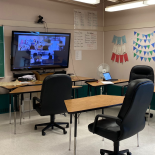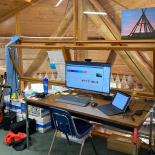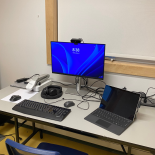Northern Distance Learning
What is Northern Distance Learning?
Northern Distance Learning expands school programming to better meet the needs of students in small communities across the Northwest Territories (NWT). Certified teachers deliver live, virtual classes to students every day during a set period. Originally created for students who needed university pre-requisites, Northern Distance Learning has evolved to now offer additional programming that may be of value or interest to any student. Northern Distance Learning is free for students and schools. Participation does not impact a school’s teaching full-time equivalency and all technology is provided to students at no cost.
How can Northern Distance Learning be used in a school?
Northern Distance Learning courses can be accessed by individual students or large groups, and can potentially add up to five teachers to a school’s programming. Implementation is tailored to the unique needs of each school. Some possibilities are:
- Individual students take one or more Northern Distance Learning classes throughout the day, working independently with regular check-ins and attendance from local staff.
- Small group(s) of students take the same Northern Distance Learning class, supporting each other, with regular attendance and check-ins from local staff.
- Small or large group of students take the same or different Northern Distance Learning courses throughout the day, supported by local school staff.
- Large group of students take the same or different Northern Distance Learning courses throughout the day, with a local teacher assigned as support in place of a locally offered class. The local teacher assumes responsibility for in-person support, working as a peer with Northern Distance Learning teachers.
What does Northern Distance Learning look like?
Northern Distance Learning space requirements have changed. Students can either work with individual small space set-ups or in larger group settings based on school space requirements.
Students work with two screens: one for accessing course materials, and the other for viewing their teacher and peers.
Northern Distance Learning uses a Moodle based Learner Management System (LMS) for course content and Microsoft Teams for daily classes. MS 365 accounts are provided for students and Adobe Creative Cloud is available for relevant courses.
2026/27 Courses offered
|
Semester 1 |
Semester 2 |
|---|---|
|
Grade 10
Grade 11
Grade 12
|
Grade 10
Grade 11
Grade 12
|
How does Northern Distance Learning perform?
Northern Distance Learning delivers an online program built on positive relationships and focusing on student success. Full-time teachers live and work in the North and understand the importance of creating a positive learning experience for students. Students are able to interact with their teachers in a variety of ways that suit their needs, such as community of learner activities, live daily classes, one-on-one meetings and chat-style conversations. For some of the most academically difficult courses, this style of synchronous (live) online programming has resulted in 69% credit acquisition from 2021/22 to 2024/25, marking a significant improvement when compared to the asynchronous (not live) online models available through southern institutions.
Enrollment process
Principals and parents make the choice to enroll students in Northern Distance Learning based on need and a student’s ability to work in a virtual setting. Students are enrolled as long as they meet pre-requisite requirements and the school does not already have 5 students enrolled in the same course.
- Students, in consultation with their principal, program support teacher, Career and Education Advisor and parent/guardians select their courses and complete an enrollment form.
- Principals submit the enrollment form to Northern Distance Learning as soon as possible, but no later than 5 days into a semester.
- A class materials list is sent to schools in May to allow principals time to order required supplies (textbooks, art and science supplies) ahead of the next year.
- Upon enrollment, Northern Distance Learning verifies technology requirements, ensuring devices are in place prior to the start of the course.



